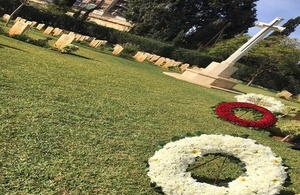Celebrating 'Remembrance Day' with veterans
Lebanese and Palestinian war veterans, who served with the British army in WWII, attended with their families Remembrance Day service

Commonwealth War Grave Cemetery Beirut
The British Embassy in Lebanon held a ‘Remembrance Day’ service at the Beirut Commonwealth War Grave Cemetery in honour of the soldiers who were killed during World Wars I and II, and in other conflicts.
The service was attended by British Ambassador Hugo Shorter; British Defence Attaché Lt. Col. Chris Gunning; Brig.-Gen. Pierre Assaf, representing Lebanese Army Commander Gen. Jean Kahwaji; Lt. Col. Samer Al Beani, representing Head of the Internal Security Forces Gen. Ibrahim Basbous; and Brig.- Gen. Fady Khawaja, representing the Director General of the General Security Major Abbas Ibrahim. Ambassadors, diplomats and military attachés of US, European and Commonwealth countries were present. Visiting President of the International Association of Athletics Federation and double Olympic gold medallist for Team GB Lord Seb Coe attended the ceremony along with Mrs May El Khalil the President of the Beirut Marathon Association.
At the end of the service, a two-minute silence was held before Ambassador Shorter and Commonwealth Ambassadors laid wreaths on the memorial. Lebanese and Palestinian war veterans, who served with the British army in World War II, attended with their families. Ambassador Shorter and Lord Coe met the veterans to thank them for their service and hear their stories of heroism during battles fought in the Middle East and Europe.
When asked what it meant for him to attend, 91 year old Lebanese veteran Fadl said:
It brings back lots of happy and sad memories. I feel young again.
Remembrance Sunday is marked in the United Kingdom and the Commonwealth to commemorate the contribution of British and Commonwealth military and civilian servicemen and women in the two World Wars and later conflicts. It is usually held on the nearest Sunday to 11 November, which was Armistice Day - the end of hostilities in the First World War in 1918.
The Beirut War Cemetery is the final resting place of around 1,200 soldiers, most of whom were from the UK, Australia, New Zealand, India and South Africa. The war graves are supervised by the Commonwealth War Graves Commission.